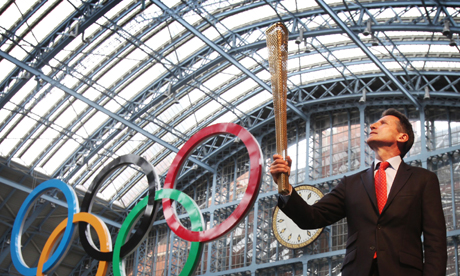2012 Olympic torch ignites row over Games’ green credentials
London 2012 organisers have been left with red faces over their green promises, coming under fire from the watchdog that monitors their sustainability claims after admitting defeat in a bid to make their Olympic flame the first low carbon version.
Unveiling the design of the Olympic torch to be carried by 8,000 runners, London 2012 chairman, Lord Coe, admitted that the sponsor EDF had failed to come up with a workable low-carbon solution for the flame that will travel the country from May and light the Olympic cauldron on July 27.
“In simple terms, we didn’t quite get there,” he said. “It’s not work that is wasted, it will be transferable for future thinking about Rio and Sochi. We just ran of time and we tried very hard to do it.” Instead, the torch will use a “tried and tested formula” of butane and propane.
In November 2007, amid a welter of other legacy promises attached to the Games, EDF promised to develop the first low-carbon torch as a symbol of its commitment to green energy. A spokesman for the French energy company vowed at the time: “It’s early days but it will happen.”
But on Wednesday Gareth Wynn, director of EDF’s 2012 programme, admitted: “EDF tackled the complex challenge of producing a new low-carbon fuel for the Olympic Torch with professionalism, expertise and drive. But the development of this wholly new low-carbon fuel for use in the 2012 torch relay still required significant engineering and design work to be carried out in time to allow for production of 8,000 torches.
The relay has an immovable deadline and both Locog and EDF concluded there would not be enough time for all the required testing.”
Shaun McCarthy, chair of the Commission for a Sustainable London 2012, said it was “disappointing”.
“The carbon contribution of this initiative may have been relatively small, but the power of the message across the globe would have been highly significant. The Olympic torch is a universal symbol of the Games, and a low-carbon torch would have been an unequivocal demonstration of London’s commitment to a truly sustainable Games,” he said.
“The promise of a low-carbon torch was made in 2007 and so the excuse of ‘we ran out of time’ is not acceptable. While we acknowledge that EDF Energy invested considerable effort into the low-carbon torch concept, this is a project with an immovable deadline and therefore commitments must be delivered.”
The design of the torch, which will be available to the 8,000 bearers to buy after their stint, is supposed to reflect the ideals of the Olympic movement.
“We wanted it to celebrate the relay and the Games,” said Edward Barber, who designed the torch with Jay Osgerby. “One of the fundamental aspects of the design is the fact there are 8,000 circles in the torch body – one for each of the torch bearers and every mile of the relay. It allows us to create something that is physically light and visually light.”
The triangular form relates to the “faster, higher, stronger” Olympic motto, the fact that it is the third London Olympics and the three founding principles of the modern Games: sport, education and culture.
Olympic organisers have faced criticism from campaigners after failing to deliver on other promises to make London 2012 the first “green Games”.
They have hit some targets but missed others. A pledge to generate 20% of energy on site, mainly from a wind turbine in the Olympic park, has been abandoned and, at most, 9% of energy on site will be from renewables.
Wynn said the work would not be wasted and that without the “inspiration of the Games” it would not have developed a bespoke low-carbon fuel based on a miscanthus briquette, which has been patented and could be used in domestic fires and garden torches.
“We were brave enough to do something completely different and we have created a new low-carbon fuel type from scratch,” he said.
“Obviously it would have been great to use it for London 2012. However, our efforts do mean that if a future organising committee wants to use a new low-carbon fuel, they will have a real head start. We would be happy to help them complete what London has started.”
guardian.co.uk © Guardian News & Media Limited 2010
Published via the Guardian News Feed plugin for WordPress.

